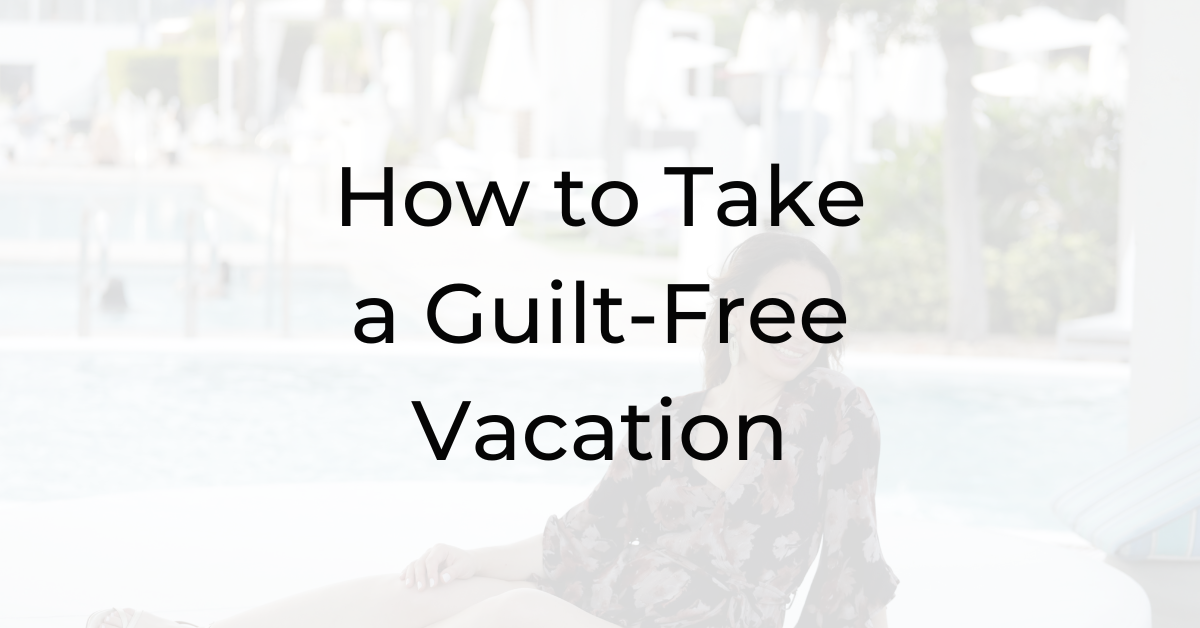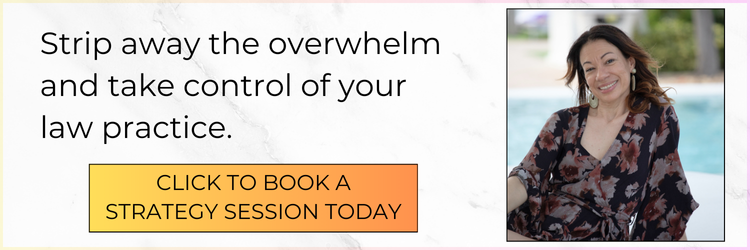Vacations are meant to restore you — but for most lawyers, they feel anything but restorative.
🔹 You worry what clients or colleagues will think about you that you’re taking time off.
🔹 You worry about emails while laying on the beach.
🔹 You worry about coming back to a tidal wave of emails, tasks, and pressure to “catch up.”
It’s no wonder you may not feel like you took a vacation at all.
In this episode of Be a Better Lawyer, I walk you through the 3 steps you must complete before leaving for a vacation, so your time away from the office actually does what it’s supposed to do:
🔹 restore your energy,
🔹 reset your nervous system, and
🔹 help you come back clear and focused.
These 3 steps are simple—but powerful.
And they’re the key to taking a guilt-free vacation.
Let’s make your time off feel like time off.
You deserve it.
RESOURCES
Read this episode: How to Take a Guilt-Free Vacation
Vacations are meant to restore you — but for most lawyers, they feel anything but restorative.
You worry about what clients or colleagues will think about you taking time off. You worry about emails while laying on the beach. You worry about coming back to a tidal wave of messages, tasks, and pressure to “catch up.”
It's no wonder you may not feel like you took a vacation at all.
Here's what I want you to understand: Taking vacation is part of your job. It's your responsibility to take care of yourself so you can take care of your clients. You need to be at your best to serve others effectively.
And here's another truth your brain doesn't want you to accept: You are not indispensable.
I know that might sting a little, but it's liberating once you really get your mind around it. I have solo practitioners who implement what I'm about to share with you who actually take two-week vacations. I have clients in Big Law doing the same thing.
The Three Phases to a Guilt-Free Vacation
There are three phases you need to work through to create a truly restorative vacation. Depending on your firm, you may not be able to implement all of these perfectly, but your brain will want to tell you that you can't do any of them — and that's simply not true.
Start this work as soon as possible, but at least one week before you leave. Give yourself at least an hour to 90 minutes to plan properly.
Phase 1: Plan the Week Before Your Vacation
Your brain will tell you “there's too much to think about” and “I don't know where to start.” Don't listen. You know exactly where to start.
First, look at what's on your calendar that needs to get done before you leave. Ask yourself:
- How can I make my work easier this week?
- Is there anything I can delegate?
- Are there phone calls I can make now to get the ball rolling on projects?
- What else can make my week easier?
Next, ask what will make your time away easier. This might include:
- Asking colleagues for coverage
- Letting people know you won't be checking emails and to only call for true emergencies (not texts!)
- Changing your voicemail message
- Setting up your out-of-office email response
Then, anticipate what might distract you while you're away. Common distractions include thoughts like:
- “A client might have a question”
- “An associate might need help”
- “Opposing counsel might want to talk”
- “Someone's going to need me”
Problem-solve for these now:
- Contact clients ahead of time to let them know you'll be away and who's covering if needed
- Give clients updates now and let them know when they'll hear from you next
- Tell associates to ask someone else questions and only call for emergencies
- Contact opposing counsel with deadlines for anything that needs resolution before you leave
- Update your email with clear instructions on who to contact while you're away
You have more control over this than you think. You get to decide when you're available to people — you don't have to be accessible all the time.
Phase 2: Create a Belief Plan for Your Time Away
Your brain might go haywire while you're on vacation. It might tell you:
- “I should be available all the time”
- “Something may have gone wrong”
- “I should check my emails just to be safe”
- “Someone might need me”
These are all lies.
When these thoughts come up, notice them but don't react. You might feel an urgent desire to check email or text your assistant. This might feel like a compulsion, like you have zero control.
You do have control. Don't let your brain ruin your vacation.
Here's how to handle it: Stop everything. Sit with that urgent desire. Breathe. Do not react. Don't text, don't email. This is how you change the habit of letting your brain run the show.
Create your belief plan — truths to remind yourself of:
- “My people are competent and can take care of things”
- “They'll call if there's something truly urgent”
- “I contacted my clients and they know they're taken care of”
- “Everything is already figured out”
Phase 3: Plan Your Week Back (Before You Leave)
This is crucial and will make Phase 2 much easier. Plan your return week before you even leave on vacation.
Keep that first week back as clear as possible. Block out time and avoid scheduling new consultations or hearings if you can. You'll have enough to catch up on without adding new commitments.
Ask yourself:
- How can I make my life easier when I get back?
- Are there projects due the week I return that I can get moving now?
- What are my three priorities for Monday morning?
- What's one thing I can do Monday morning that will be the domino to make my whole week easier?
One of my clients discovered she was making her return harder by thinking she needed to review all her files for updates. Instead, she realized she could send a mass email to the attorneys who covered her cases asking for any updates — her Monday morning domino that would get information flowing while she tackled other priorities.
A Word of Warning
Even if you plan everything perfectly, you'll still be tempted to check email or respond to texts. Here's how this typically plays out:
You'll compulsively check email, see something you think you “should” respond to because it'll make your week easier, send that email, get a response, then feel obligated to check again. Suddenly you're thinking about work during your entire vacation.
Or an associate will text with a non-emergency question even though you told them to only call for emergencies. They're testing to see if you're checking your phone. Ignore the text. You're implementing a boundary.
The solution: Trust yourself to have planned adequately. Trust others to call if there's a real emergency. Trust that you can handle whatever happens when you return.
Your vacation is basically an exercise in self-trust.
Making It All Work
Remember, if you want something different to happen, you've got to do things differently. If these steps feel uncomfortable, that's normal — anytime we do something new, we feel uncomfortable.
But doing these things will ensure your clients are taken care of and help your brain be more at ease while you're away.
You deserve to take restorative time off. You've earned it. And when you return, refreshed and clear-headed, you'll be even better at serving your clients and building your practice.
The key is planning ahead, setting boundaries, and trusting that everything will be fine without you constantly monitoring it.
Your time off should actually feel like time off. These three phases will make that possible.
💖
Dina




